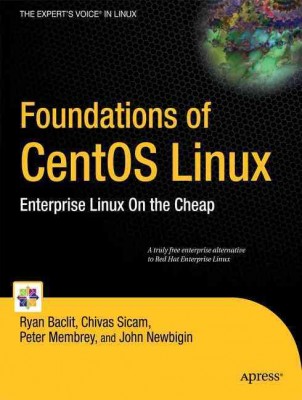| Foundations of CentOS Linux: Enterprise Linux on the Cheap Contributor(s): Sicam, Chivas (Author), Baclit, Ryan (Author), Membrey, Peter (Author) |
|||||||
 |
ISBN: 1430219645 ISBN-13: 9781430219644 Publisher: Apress
WE WILL NOT BE UNDERSOLD! Click here for our low price guarantee Binding Type: Paperback Published: November 2009 Click for more in this series: Books for Professionals by Professionals |
||||||
| Additional Information |
| BISAC Categories: - Computers | Software Development & Engineering - General - Computers | Operating Systems - Linux - Computers | Programming - Open Source |
| Dewey: 005.446 |
| Series: Books for Professionals by Professionals |
| Physical Information: 1.1" H x 7.5" W x 9.2" L (1.65 lbs) 528 pages |
| Features: Bibliography, Illustrated, Index, Price on Product, Table of Contents |
| Descriptions, Reviews, Etc. |
| Publisher Description: Introduction Community Enterprise Operating System, or CentOS, is an enterprise Linux distribution. It was developed by the CentOS Project community using the source code of the commercial Linux distribution from Redhat, the Redhat Enterprise Linux (RHEL). They created CentOS to have a free alternative to RHEL and to have a Linux distribution that's as stable as its commercial counterpart and can keep up with the requirements of the enterprise. Using CentOS is a good choice to learn Linux not only for its RHEL roots but also for its compatibility, quality, and support. CentOS is binary compatible with the RHEL because it was built using the source code of RHEL. Also, the developers made sure to adhere to the redistribution rules of RHEL when they built CentOS so it would be a truly free alternative to the original. CentOS is continuously being developed by its core developers and its community. They make security and software updates and quality assurance measures to maintain the stability of the distribution. The packages they build for CentOS are placed on their distributed mirror network to allow users to download and install software on their system manually if needed. Because of the core developers and its community, CentOS is able to have a constant release upgrade schedule to allow users to use new software and to support new hardware. They are also increasing in numbers, and that means there's always a better CentOS after each release. |
| Customer ReviewsSubmit your own review |
| To tell a friend about this book, you must Sign In First! |